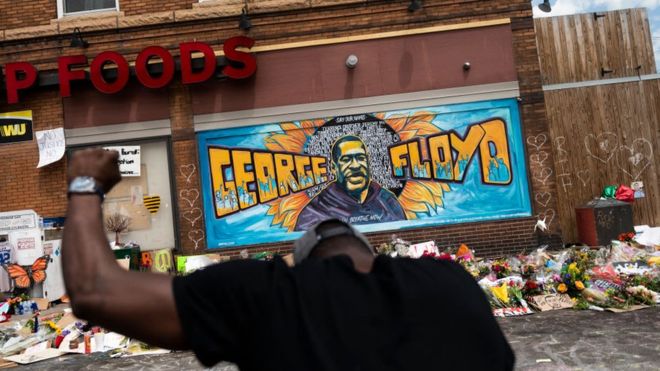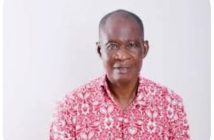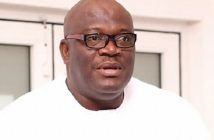George Floyd’s death should have been classified as “undetermined”, an expert has told the murder trial of former US police officer Derek Chauvin.
Forensic pathologist David Fowler told the court in Minnesota that the cause of Mr Floyd’s death was not clear.
Mr Fowler said in his view, drug use, heart disease and other factors contributed to Mr Floyd’s death.
Mr Fowler was a key witness for the defence of Mr Chauvin, who has denied charges of murder and manslaughter.
His defence team is trying to contradict earlier expert testimony that Mr Floyd died from lack of oxygen during his arrest in Minneapolis, Minnesota last May.
Prosecutors argue that Mr Floyd died of asphyxia after Mr Chauvin, 45, was filmed kneeling on his neck for more than nine minutes.
The footage of Mr Chauvin, who is white, restraining Mr Floyd, a black man, on the floor as he shouted “I can’t breathe” spurred global protests against racism.
This week the anger that exploded in the wake of Mr Floyd’s death was reignited by the fatal shooting of a black man, Daunte Wright.
The shooting happened on Sunday in a Minnesota suburb only 10 miles (16 km) away from the court where Mr Chauvin’s trial is taking place, setting off days of protests.
On Wednesday, a prosecutor charged Kim Potter, a white police officer who shot dead Mr Wright during a traffic stop, with second-degree manslaughter.
What did the defence’s expert say?
Dr Fowler, who was chief medical examiner for the state of Maryland until his retirement in 2019, was called to testify by Mr Chauvin’s defence on the 13th day of the trial.
He was questioned about the findings of the Hennepin County medical examiner, who ruled Mr Floyd’s death a homicide.
“I would fall back to undetermined, in this particular case,” Dr Fowler testified.
He said, in his opinion, the cause of death was not clear because there were “so many conflicting different potential mechanisms”. These complicating factors, he said, could be considered homicide in some cases, and accidental in others.
Mr Floyd’s consumption of fentanyl and methamphetamine, and his possible exposure to carbon monoxide poisoning from the police car’s exhaust, were among the complicating factors cited by Dr Fowler.
Asked about the cause of death, Dr Fowler said he believed Mr Floyd suffered “a sudden cardiac arrest” while struggling with the officers.
Dr Fowler said Mr Floyd’s health problems contributed to an erratic beating of his heart, known as sudden cardiac arrhythmia.
In response, prosecutor Jerry Blackwell launched an aggressive cross-examination of Dr Fowler, questioning his conclusions and credibility as a witness.
Under questioning, Dr Fowler admitted that someone who dies from being deprived of oxygen ultimately dies of an arrhythmia.
“Every one of us in this room will have a fatal arrhythmia at some point,” Dr Fowler testified.
Dr Fowler also agreed that Mr Floyd should have been given immediate medical attention when he went into cardiac arrest, as there still was a chance to save his life.
Mr Chauvin has been charged with second-degree unintentional murder, third-degree murder, and manslaughter. He pleaded not guilty to all charges.
He faces up to 40 years in prison if convicted of the most serious charge – second-degree murder.
A conviction on any of the counts against Mr Chauvin will require the nine-woman, five-man jury to return a unanimous verdict.
What else happened in court?
Earlier on Wednesday, the judge presiding over the trial denied a defence motion to acquit Mr Chauvin of all charges.
Defence attorney Eric Nelson said prosecutors had failed to prove their case against Mr Chauvin beyond reasonable doubt.
The motion is a standard request in criminal trials at the end of the presentation of the prosecution case and it was rejected by Hennepin County Judge Peter Cahill.
Judge Cahill also said he would allow a potential defence witness to invoke his right – under the Fifth Amendment of the US Constitution – not to testify.
Morries Hall was with Mr Floyd on the day of his arrest and his lawyer told the judge that his client could “not answer any questions without incriminating himself”.
What was the prosecution’s case?
Last week the court heard from several expert witnesses who testified that Mr Chauvin’s use of force was excessive.
They were also steadfast in their belief that Mr Floyd died from being subdued and not from drug use or ill health.
The police chief who fired the officer after seeing the video of him kneeling on Mr Floyd’s neck told the court his actions went against all police training.
There were also eyewitnesses who described their concerns for Mr Floyd as they watched the arrest taking place.
Source: BBC





